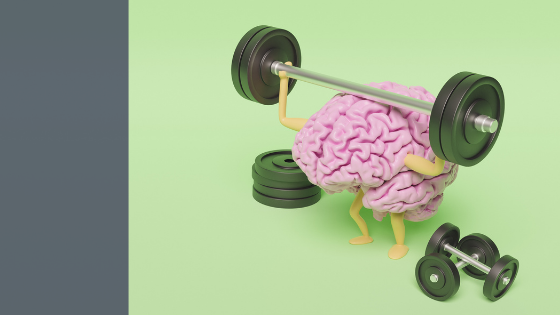How is the brain like a muscle? Well, for starters, your brain can grow stronger and faster with exercise….mental exercise, that is. Research has also proven that even physical activity can improve brain function. So when I mentor and tutor high schoolers to get them to their highest ACT and SAT scores ever, I’m a little bit like their personal trainer.
Of course, before you take a test—whether it's the ACT, the SAT, or even that daunting Chem final—you want to do everything you possibly can, prep-wise, to ensure the best outcome. That includes studying ahead of time (which is a given), hiring a tutor (like moi!) to design a customized plan of action for you….
AND (the subject of today’s post) training your brain to maximize what you know while minimizing self-doubt and anxiety.
Today, I’m sharing some of my favorite mental exercises—I refer to them as "mental mastery techniques"— that you should consider incorporating come test time. Worry not: they’re pretty easy to grasp, and they’re all definitely worth trying!
ARTICLE CONTENTS
1. Power Poses
1. Power Poses and Test-Taking
You don’t have to be Spiderman to feel like a superhero….or achieve a superhuman score! Stay with me here, because it seems goofy at first. BUT, if you strike an imposing stance (literally!) right before sitting for your test, you may get the added mental sharpness to defeat your Lex Luthor—er, I mean, your ACT or SAT.
So what is the superhero pose? Stand with your legs spread apart and your hands on your hips with your elbows outwardly bent. Think Wonder Woman. Hold this pose for 2 full minutes.
Research shows that this type of open body language reliably improves mood and self-esteem. In other words, you’ll enter your test feeling more confident….and, therefore, ready to ace that test.
2. Use the Pomodoro Method for SAT/ACT Studying
Although you don’t want to study for 2-3 hours STRAIGHT everyday (you’ll burn out!), it IS actually helpful to practice studying for shorter stretches without breaks and continuous distractions.
Try this: study intensely for 25 minutes, then take a five-minute break. Then repeat. You can do this for two hours and have a nice four-session study period.
This type of study method is known as the Pomodoro technique. It’s a work-reward system. You work hard for a relatively short period, and then you reward yourself with a break where you do something completely different (step outside to soak up a few minutes of sun, make yourself an iced tea, do 25 push-ups—it’s up to you!).
Here’s why it works: Breaking your learning up into more manageable chunks helps the whole task feel less daunting. It’s easier to say to yourself, “I’m going to study as hard as I can for 25 minutes” than it is to say “I’m going to study for two whole hours. By the time I’m done, the sun will have set :( ”
And as an added bonus, it turns out you actually remember more when you study in sprints instead of marathons! Even though you’ll technically only be studying for an hour and 40 minutes (when you factor in the breaks) and not two hours, those short study sessions will be much MORE effective than two nonstop hours would be. You’ll be more focused during those short sessions and less likely to give in to distractions.
Of course, you can go longer than two hours with the Pomodoro method, but if you do, be sure to take a longer break after four Pomodoros (a 20-minute pause is good).
3. Sleep or Cram the Night Before a Standardized Test?
Think of it this way: sleep is when your mind gets to work out. Your gray matter does some of its best work at night time, when external input is at a minimum and your neurons and lobes can finally start reorganizing and restoring.
The night before your exam is no time to cram. You’ll be better served by getting some serious shuteye.
Studies have shown that students who slept at least seven hours before taking an exam scored 10% higher than those students who received much less sleep!
Not only does sleep help regulate cortisol (that pesky stress hormone, which can actually act against you when you’re at the testing desk). Shuteye also allows your brain to process the information you’ve taken in during the day (i.e. what you’ve studied) and turn short-term information into long-term memory.
4. Read Aloud When You’re Studying
This is another weird-but-true one,. It turns out that speaking your study material out loud can actually improve your memory retention! And you’ll score even BETTER if you study aloud to another person.
Researchers suggest that the conversational component of speaking to another person helps you remember more of what you’re saying. But, even if no one’s around, it’s still beneficial to read your study notes out loud. The sensorimotor aspect of verbal expression makes it way easier for the brain to associate random facts with a meaningful interaction.
So, while it does take longer to read aloud than to do it silently, remember that you’re actually training your brain to remember….thus saving you time and points in the long run of your studying journey.
5. How to Use Visualization for Test-Taking
One of the best ways to chip away your stress is to visualize yourself already having passed the finish line. Close your eyes and imagine your life after successfully acing your test. You have a big smile on your face, sure, but what else are you doing?
Perhaps you’re holding your SAT score report, or you're entering those top-notch scores in your Common App account, or you’re celebrating with your parents at a fancy dinner. Imagine it in vivid color and as many details as possible. Hold on to that feeling of ecstasy and relief.
In the moments before taking your test, focus on that visualization of you after acing your testing. It feels like sunshine, but, believe it or not, it’s more than just wishful thinking:
Visualization shows your brain what success looks like to you. Once you have a clear focus, your brain will be better equipped to make the connection from where you are to where you want to be.
Visualization also motivates you to do whatever’s needed to make your vision a reality.
And last, but not least, visualization works behind the scenes in your subconscious mind to help you attain your goal—in this case, passing the test with flying colors.
What NOT to do before the SAT and ACT
Whatever you do, don’t cram the night before!
Instead, incorporate these tried-and-true mental mastery techniques. And if you were wondering if I’ve got more tips to share….why yes, I very much do! Meet my new, fully online course:
For $95, this set of self-directed, infinitely re-watchable videos will bring you LOADS of hacks, strategies, and big-picture reframings that will help you melt your test anxiety away.
If you consider yourself a “bad test taker,” or totally freeze up on a certain section of the ACT, or just KNOW you’re capable of a higher score than you’ve been getting….this course is for you.
Good luck, and if you’d like help developing a unique-to-you plan to get YOUR test anxiety under control, learn more about working with me here.








